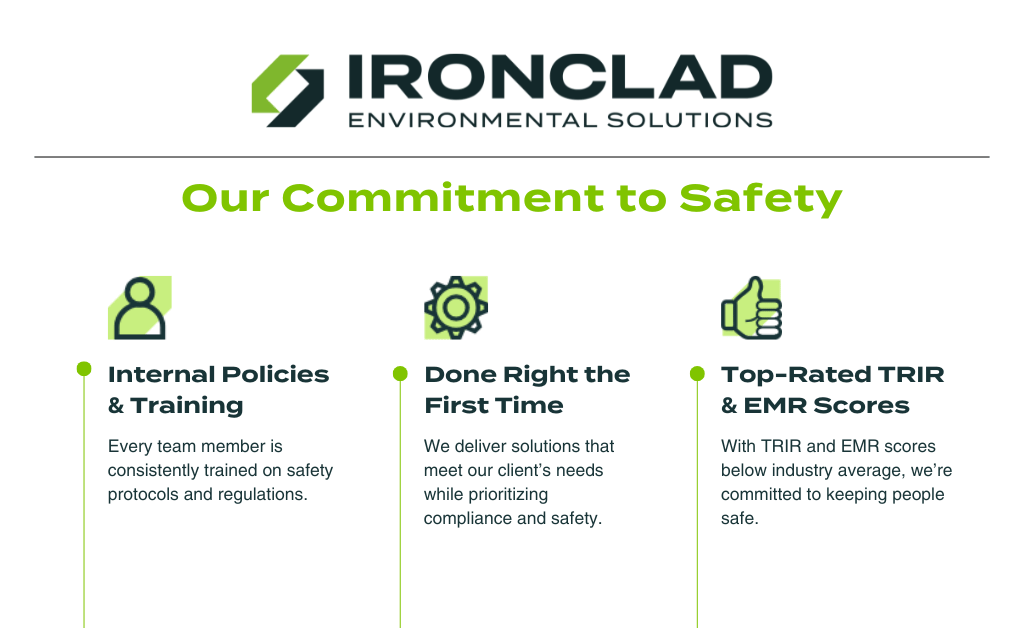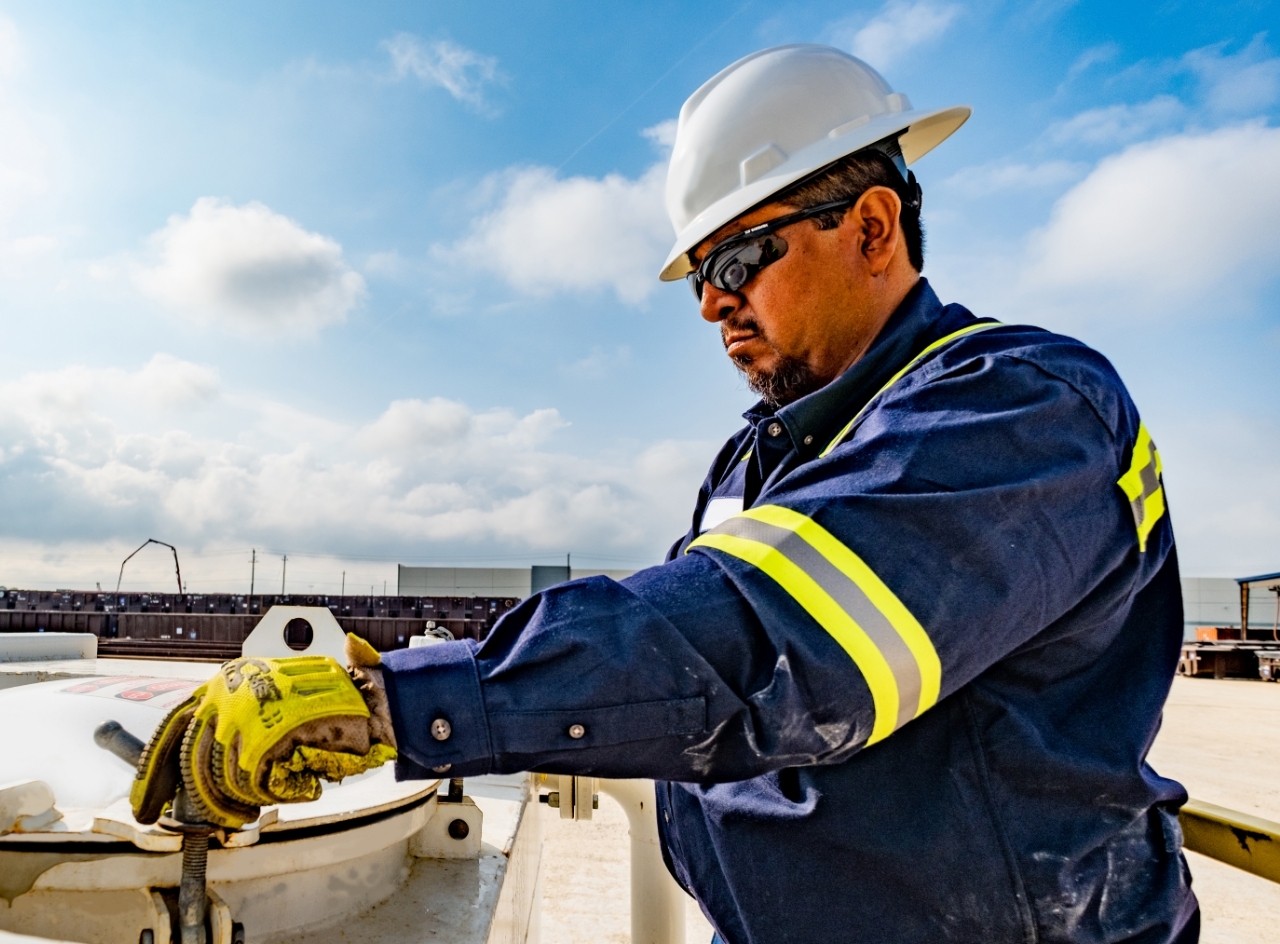The Importance of Safety & Compliance in the Waste Management Industry
Safety and compliance are non-negotiable in the waste management and specialty containment industry. By prioritizing environmental health and safety practices, companies can protect human health, prevent environmental damage, and meet strict regulatory standards.
Effective waste containment directly supports safety by preventing leaks, spills, fires, explosive reactions and contamination. Partnering with an experienced team ensures you have the right equipment and expertise to address challenges while maintaining the highest standards of compliance.
With a trusted partner like Ironclad Environmental, we make sure every job begins and ends with safety. Our top priority is always to keep personnel, equipment, and the environment safe.
Key Safety Concerns in the Waste Management Industry
Environmental health and safety (EH&S) practices are designed to protect people and the environment from harm during industrial projects. EH&S focuses on identifying and controlling risks associated with hazardous materials, ensuring safe handling, storage, and disposal. When prioritized, these measures contribute to sustainable and response waste management operations.
Common Safety Hazards in Waste Containment
Several safety hazards must be addressed to ensure secure containment:
- Hazardous Chemicals and Waste: Improper handling or storage can lead to environmental damage or violations of safety regulations.
- Fire Protection Risks: Some materials stored in containment systems are flammable, requiring robust safety measures to mitigate risks.
- Leaks and Spills: Even minor containment failures can have significant consequences, including contamination and expensive cleanup efforts.
Addressing these hazards requires well-designed containment solutions and the expertise of teams who understand the specific challenges of managing hazardous materials.
Risk Assessments and Safety Programs
Risk assessments are critical to proactively identifying and addressing safety concerns in waste management operations. These assessments evaluate potential hazards and provide actionable insights to improve safety procedures.
Safety programs also play an important role by empowering teams to follow best practices, respond effectively to emergencies, and maintain compliance with changing regulations. Together, regular risk assessments and comprehensive safety programs help ensure operations run smoothly and keep people and the environment safe.
How Strong Safety Practices Protect Workers and the Environment
Safety training is the first line of defense in protecting workers from the risks associated with hazardous materials. Proper training ensures employees understand the procedures and equipment necessary to perform their duties safely and prevent unsafe conditions.
A robust safety policy, paired with skilled safety managers, forms the foundation for a secure environment. Comprehensive policies outline clear protocols for managing risks, while experienced safety managers ensure these guidelines are effectively implemented. Together, they:
- Minimize workplace hazards
- Protect human health and workplace safety
- Promote accountability and consistency in safety practices
Whether responding to spills, leaks, or other safety issues, having a clear emergency preparedness plan allows teams to act quickly and effectively.
Regulatory Compliance
The industries that waste management companies deal with can be challenging, making it crucial to comply with safety requirements and rules. Key regulatory agencies include:
- Resource Conservation and Recovery Act (RCRA): Governs the management of hazardous and non-hazardous solid waste, setting guidelines for its transportation, treatment, storage, and disposal.
- Environmental Protection Agency (EPA): Enforces rules to protect air, water, and land from pollution. For waste management, EPA covers proper handling, containment, and disposal of hazardous waste.
- Texas Commission on Environmental Quality (TCEQ): Oversees environmental regulations around hazardous waste storage, transportation, and disposal for safeguarding public health and natural resources.
- Occupational Health and Safety Administration (OSHA): To assure safe and healthful working conditions for working men and women; by authorizing enforcement of the standards developed under the Act; by assisting and encouraging the States in their efforts to assure safe and healthful working conditions; by providing for research, information, education, and training in the field of occupational safety and health; and for other purposes.
By following these regulations, companies not only reduce risks but also demonstrate their commitment to ethical and sustainable operations.
Why Experience Matters: Choosing the Right Safety Partner
In the waste management industry, experience is more than an asset - it's a necessity. Partnering with a team that has a proven record in safety ensures that your operations run smoothly, efficiently, and without compliance issues. Experienced safety professionals understand the unique challenges of handling hazardous materials, bringing the knowledge and insight needed to:
- Anticipate and address potential safety hazards
- Minimize environmental risks through reliable, effective solutions
- Maintain compliance with industry safety standards
By working with an experienced partner, businesses gain confidence in their waste management processes, knowing that safety and compliance are built into every step.

Our Commitment to Safety
At Ironclad Environmental, safety isn't just part of what we do - it's at the core of every service we provide. From our equipment to our internal operations, we take every measure to ensure safe and compliant solutions for our clients.
Internal Policies and Training
Our commitment to safety translates to continuous learning and relearning of safety protocols and regulations. Every team member is trained to manage safety challenges proactively.
Done Right the First Time
Our goal is to minimize problems, not create new ones. With relationships built on trust and results, we deliver solutions that meet our client's unique needs while prioritizing compliance and safety.
Top-Rated TRIR and EMR Scores
Safety is measurable, and our results speak volumes. With TRIR and EMR scores below the industry average, we demonstrate our commitment to creating safe job sites and protecting everyone involved.
This commitment - combined with our fleet of rigorously tested frac tanks, roll-off boxes, stainless steel tankers, and more - ensures that every project is executed with precision and care. Our proactive approach means potential safety concerns are addressed before they arise, safeguarding workers and the environment.

Prioritizing Safety with Ironclad Environmental
As the largest specialty containment company in the United States, we are committed to delivering safe, reliable, and compliant waste management solutions. Our approach is built on nearly four decades of industry expertise, providing tailored strategies to meet the specific needs of companies across a wide range of industries. From managing flooding and contaminated groundwater to addressing chemical waste concerns, we offer solutions designed to mitigate risks and maintain regulatory compliance.
What makes us stand out is our dedication to quality service, access, and honesty. We bring equipment directly to your job site, handle setup with care, and ensure seamless operations from start to finish. Our focus on providing reliable support makes us the most trusted partner in the industry.
Speak to an Expert Today
Contact us today to explore how our specialty containment solutions can help your business stay safe, compliant, and prepared for any waste management challenge.
Resources:
- Environmental Protection Agency. https://www.epa.gov/
- OSHA. https://www.osha.gov/
- Texas Commission on Environmental Quality. https://www.tceq.texas.gov/